Brain Injury Bites
Brain Injury Bites is a brain injury podcast exploring the real-life challenges and triumphs of life after a brain injury. Through open conversations, expert interviews, and powerful lived experiences, it sheds light on what recovery and rehabilitation truly look like.
Hosted by Brooke Trotter, a brain injury survivor, and Ashwini Kamath, a specialist solicitor and Headway Warrington trustee, each episode provides practical advice, emotional support, and expert guidance for anyone affected by brain injury, including survivors, family members, carers, and healthcare professionals.
Topics include brain injury rehabilitation, fatigue and memory loss, nutrition and mental health, legal and financial support, and day-to-day coping strategies.
Whether you're living with a traumatic brain injury (TBI), recovering from a concussion, or supporting someone on their journey, our Brain Injury Bites podcast is here to help you understand, manage, and live well after brain trauma.
Brain Injury Bites is a brain injury podcast exploring the real-life challenges and triumphs of life after a brain injury. Through open conversations, expert interviews, and powerful lived experiences, it sheds light on what recovery and rehabilitation truly look like.
Hosted by Brooke Trotter, a brain injury survivor, and Ashwini Kamath, a specialist solicitor and Headway Warrington trustee, each episode provides practical advice, emotional support, and expert guidance for anyone affected by brain injury, including survivors, family members, carers, and healthcare professionals.
Topics include brain injury rehabilitation, fatigue and memory loss, nutrition and mental health, legal and financial support, and day-to-day coping strategies.
Whether you're living with a traumatic brain injury (TBI), recovering from a concussion, or supporting someone on their journey, our Brain Injury Bites podcast is here to help you understand, manage, and live well after brain trauma.

Who Brain Injury Bites Is For
This brain injury podcast is designed for anyone affected by brain injury, including:
- Survivors rebuilding their lives and independence
- Families and carers supporting loved ones through recovery
- Professionals working in neurorehabilitation, law, or healthcare
Each conversation provides practical advice, shared experience, and reassurance that you’re not alone in navigating life after brain trauma.

Why We Started Brain Injury Bites
We launched Brain Injury Bites to bridge the gap between professional guidance and lived experience. Drawing on both the medical and emotional aspects of recovery, we provide practical advice, insights, and first-hand experiences to support people living with a brain injury and those who care for them.
Each episode explores topics such as brain injury rehabilitation, fatigue, memory challenges, coping strategies, and day-to-day practical tips, making complex issues accessible and relevant for survivors, families, and professionals.
Episodes
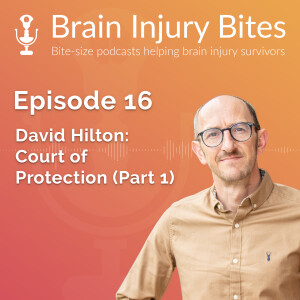
Monday Oct 09, 2023
Monday Oct 09, 2023
In this episode of Brain Injury Bites, Brooke Trotter and Ashwini Kamath speak with David Hilton, a solicitor and professional deputy, about the legal and financial support available to people who are no longer able to manage their own affairs after a brain injury.
David explains what the Court of Protection does, how deputies are appointed, and why these roles are essential when someone lacks capacity to make important decisions. Brooke shares his personal experience of living under the Court of Protection and how this support has helped him stay safe, financially stable and independent.
They explore:
What a professional deputy is and how they support clients
The Mental Capacity Act and how capacity is assessed in law
The emotional impact of needing help with everyday decisions
Common misunderstandings about control versus support
Why insight, memory and multi-tasking all affect daily functioning
The importance of empowering people to make their own choices
Whether you are navigating brain injury yourself or helping someone who is, this episode offers practical advice, legal insight and honest conversation about trust, support and making life work when you need help.
For a transcript, follow the link below:
Episode Transcript
To keep up to date with our podcast, follow us on our social media accounts:
Twitter
Facebook
Instagram
Community Compass app!
Brain Injury Bites is now part of the Community Compass app! Download now and take the first step toward reclaiming your best life - because you’re not alone in this journey.
Google Play
Apple App Store
Notice:
Information and other content provided in this Podcast should not be taken as providing medical advice or recommendations. Please always consult your doctor or treating team for medical advice.
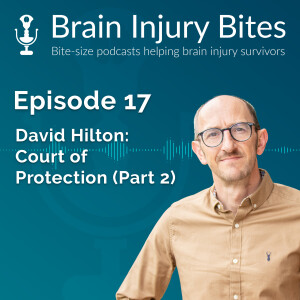
Tuesday Oct 10, 2023
Court of Protection After Brain Injury (Part 2): Who Makes the Decisions?
Tuesday Oct 10, 2023
Tuesday Oct 10, 2023
In this episode of Brain Injury Bites, Brooke Trotter and Ashwini Kamath continue their conversation with solicitor and professional deputy David Hilton, diving deeper into how the Court of Protection works and what it really means to manage someone’s affairs after a brain injury.
David explains the oversight and responsibilities that come with being a deputy, whether professional or a family member, and shares real life examples of how decisions are made, challenged and supported. The conversation covers financial safeguarding, unusual requests, emotional boundaries and the need for trust when supporting someone who lacks capacity.
They explore:
How the Office of the Public Guardian supervises deputies
The risks of financial misuse and what support exists for families
What a personal injury trust is and how it differs from deputyship
Changing deputies, and when the court may or may not agree
The emotional demands of the role and the need for objectivity
Real stories from practice, from sequin tuxedos to digital currency
Whether you are a deputy, a family member or someone supported by the Court of Protection, this episode offers clarity, reassurance and real world insight into a system designed to protect and empower.
For a transcript, follow the link below:
Episode Transcript
To keep up to date with our podcast, follow us on our social media accounts:
Twitter
Facebook
Instagram
Community Compass app!
Brain Injury Bites is now part of the Community Compass app! Download now and take the first step toward reclaiming your best life - because you’re not alone in this journey.
Google Play
Apple App Store
Notice:
Information and other content provided in this Podcast should not be taken as providing medical advice or recommendations. Please always consult your doctor or treating team for medical advice.
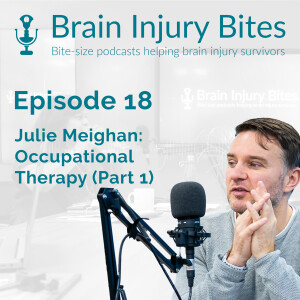
Monday Oct 16, 2023
Monday Oct 16, 2023
In this episode of Brain Injury Bites, Brooke Trotter and Ashwini Kamath are joined by Julie Meigan, a specialist occupational therapist who supported Brooke during his early rehabilitation. They reconnect to explore the real value of occupational therapy and the challenges of rebuilding everyday life after a brain injury.
Julie explains how occupational therapists help people regain independence by breaking down daily tasks into manageable steps, setting meaningful goals, and tackling barriers such as fatigue, memory loss and lack of insight. Brooke shares how strategies like meal planning, structured rest and activity pacing helped him navigate the fatigue and overwhelm of recovery.
They explore:
What occupational therapy really is and how it supports recovery
Why meaningful goals matter more than generic tasks
The role of insight and motivation in successful rehabilitation
How fatigue affects everything from shopping to memory and mood
The three Ps of fatigue management: plan, pace and prioritise
Real world strategies for sleep, routine and managing energy
Whether you are living with a brain injury or supporting someone who is, this episode offers practical tools, professional insight and a heartfelt look at what it takes to rebuild life after injury — one step at a time.
For a transcript, follow the link below:
Episode Transcript
To keep up to date with our podcast, follow us on our social media accounts:
Twitter
Facebook
Instagram
Contact details:
juliemeighan@outlook.com
www.juliemeighantherapy.com
Community Compass app!
Brain Injury Bites is now part of the Community Compass app! Download now and take the first step toward reclaiming your best life - because you’re not alone in this journey.
Google Play
Apple App Store
Notice:
Information and other content provided in this Podcast should not be taken as providing medical advice or recommendations. Please always consult your doctor or treating team for medical advice.
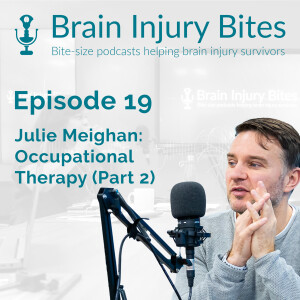
Tuesday Oct 17, 2023
Occupational Therapy After Brain Injury (Part 2): Purpose, Support & Progress
Tuesday Oct 17, 2023
Tuesday Oct 17, 2023
In this episode of Brain Injury Bites, Brooke Trotter and Ashwini Kamath continue their conversation with specialist occupational therapist Julie Meigan, exploring what meaningful rehabilitation really looks like and how progress is built through collaboration, honesty and small practical steps.
Julie shares how working in a multidisciplinary team helps turn big goals into realistic plans, and why therapy should always be something done with, not to, a person. Together, they reflect on setbacks, unrealistic expectations and the power of celebrating small wins that add up over time.
They explore:
Why setting meaningful and achievable goals is key to motivation
The importance of collaboration between therapists, families and clients
How to adapt when goals are not met and why that is OK
Coping with disappointment when things feel harder than expected
Why insight can be both a breakthrough and an emotional challenge
Managing the return to work and the complex emotions that come with it
Whether you are recovering from a brain injury, supporting someone who is, or working in rehabilitation, this episode offers warmth, realism and professional insight into how recovery is rarely a straight line but always worth the journey.
For a transcript, follow the link below:
Episode Transcript
To keep up to date with our podcast, follow us on our social media accounts:
Twitter
Facebook
Instagram
Contact details:
juliemeighan@outlook.com
www.juliemeighantherapy.com
Community Compass app!
Brain Injury Bites is now part of the Community Compass app! Download now and take the first step toward reclaiming your best life - because you’re not alone in this journey.
Google Play
Apple App Store
Notice:
Information and other content provided in this Podcast should not be taken as providing medical advice or recommendations. Please always consult your doctor or treating team for medical advice.
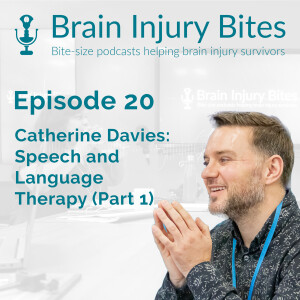
Monday Oct 23, 2023
Speech Therapy After Brain Injury (Part 1): with Catherine Davies
Monday Oct 23, 2023
Monday Oct 23, 2023
In this episode of Brain Injury Bites, Brooke Trotter and Ashwini Kamath are joined by Catherine Davies, a specialist speech and language therapist from SLT for Life, to explore the wide-ranging impact of communication and swallowing difficulties after a brain injury.
Catherine explains how speech and language therapy goes far beyond speech, helping with everything from breath control and word finding to emotional expression, social interaction and safe swallowing. Brooke reflects on his own journey through therapy, sharing real-life challenges and surprising insights, including how video feedback, dysarthria, and even jokes about venison played a role in his recovery.
They explore:
What speech and language therapy really involves after brain injury
Why swallowing is automatic, and how it can become dangerous when it goes wrong
Dysarthria, dyspraxia and how damaged muscles affect speech clarity
Cognitive fatigue, word finding, and the struggle to keep up in conversation
The emotional impact of losing confidence, self-awareness and social skills
Literal interpretation, humour and the hidden challenges of everyday interaction
Whether you are adjusting to life after brain injury or supporting someone who is, this episode offers clinical insight, personal experience, and real compassion for the complex role communication plays in recovery.
For a transcript, follow the link below:
Episode Transcript
To keep up to date with our podcast, follow us on our social media accounts:
Twitter
Facebook
Instagram
Community Compass app!
Brain Injury Bites is now part of the Community Compass app! Download now and take the first step toward reclaiming your best life - because you’re not alone in this journey.
Google Play
Apple App Store
Notice:
Information and other content provided in this Podcast should not be taken as providing medical advice or recommendations. Please always consult your doctor or treating team for medical advice.
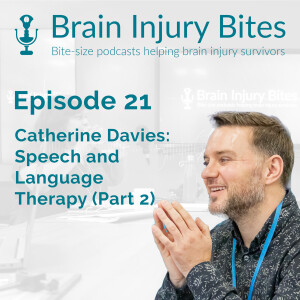
Tuesday Oct 24, 2023
Tuesday Oct 24, 2023
In this episode of Brain Injury Bites, Brooke Trotter and Ashwini Kamath continue their rich and insightful conversation with specialist speech and language therapist Catherine Davies, diving deeper into the subtleties of communication, voice, identity and recovery after a brain injury.
They explore how difficulties with speech, tone, social interaction and humour can have a profound impact on confidence and relationships. Catherine shares her experiences working across a wide spectrum of communication needs, including how small changes, such as using emojis or practising karaoke, can help rebuild self-expression, self-awareness, and connection.
They explore:
Why insight and “invisible” communication difficulties can affect quality of life
The emotional toll of feeling left behind socially or professionally
Disinhibition, misreading tone and how they affect relationships
Aphasia, dysphasia and the differences between speech and language issues
How singing, games and creativity can unlock communication
The importance of multidisciplinary teamwork in neurorehabilitation
Whether you are navigating recovery, working in healthcare or simply curious about the power of communication, this episode offers warmth, clinical clarity and real human stories that shine a light on the less visible sides of brain injury.
For a transcript, follow the link below:
Episode Transcript
To keep up to date with our podcast, follow us on our social media accounts:
Twitter
Facebook
Instagram
Community Compass app!
Brain Injury Bites is now part of the Community Compass app! Download now and take the first step toward reclaiming your best life - because you’re not alone in this journey.
Google Play
Apple App Store
Notice:
Information and other content provided in this Podcast should not be taken as providing medical advice or recommendations. Please always consult your doctor or treating team for medical advice.
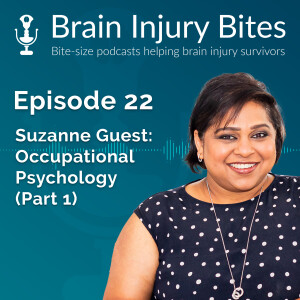
Monday Nov 13, 2023
Monday Nov 13, 2023
In this episode of Brain Injury Bites, Brooke Trotter and Ashwini Kamath are joined by occupational psychologist Suzanne Guest to explore how people with brain injury can rebuild their working lives — and why purpose, self-esteem and support are vital along the way.
Suzanne shares her experience helping people return to work or find meaningful activity after brain injury, whether through job retention, career change or developing new skills. They discuss how work is not just about income — it shapes identity, structure and confidence. Brooke opens up about his own journey, from uncertainty and depression to finding meaning through contribution and connection.
They explore:
What occupational psychology is, and how it supports brain injury rehabilitation
The role of work in self-worth, identity and everyday life
Why focusing on strengths matters just as much as managing difficulties
How goals, purpose and structure can protect mental health
Supporting people who are new to work, or returning after a long break
The emotional impact of career change, loss and starting again
Whether you are returning to work yourself or supporting someone through rehabilitation, this episode offers practical insight, honest conversation and hope for building a future after injury.
For a transcript, follow the link below:
Episode Transcript
To keep up to date with our podcast, follow us on our social media accounts:
Twitter
Facebook
Instagram
Helpful links:
Headway – Guide for employers: https://www.headway.org.uk/media/4123/brain-injury-a-guide-for-employers.pdf
Video Richard Hammond and Sterling Moss: https://www.youtube.com/watch?v=k6iVODBpatM
Video Imitation Game – Sandwiches: https://www.youtube.com/watch?v=Unfyov17E8s
Contact details:
https://www.workinmind.co.uk/
https://twitter.com/suzguest
https://www.tiktok.com/@haveigotsuzforyou
https://www.youtube.com/@haveigotsuzforyou
https://www.instagram.com/haveigotsuzforyou/
Community Compass app!
Brain Injury Bites is now part of the Community Compass app! Download now and take the first step toward reclaiming your best life - because you’re not alone in this journey.
Google Play
Apple App Store
Notice:
Information and other content provided in this Podcast should not be taken as providing medical advice or recommendations. Please always consult your doctor or treating team for medical advice.
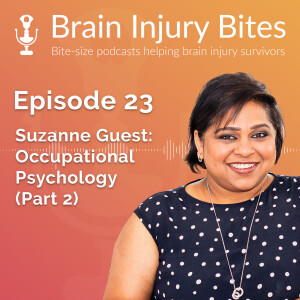
Tuesday Nov 14, 2023
Tuesday Nov 14, 2023
In this episode of Brain Injury Bites, Brooke Trotter and Ashwini Kamath continue their conversation with occupational psychologist Suzanne Guest, diving into the real world challenges of returning to work, managing fatigue, and finding meaningful activity after a brain injury.
They explore what a phased return to work should look like — not just in hours, but in tasks, support and emotional readiness. Suzanne shares powerful insights into what makes return to work succeed or fail, and why sometimes success means choosing to leave with dignity rather than pushing through.
They explore:
The reality of invisible disabilities and misunderstanding in the workplace
What a meaningful phased return really involves — beyond a simple timetable
The emotional weight of leaving work and redefining your identity
How insight, anxiety and social interaction shape recovery
Creative ways to contribute when paid work is not the right path
Why little and often is often better than pushing through
Whether you are trying to get back to work or simply looking for ways to rebuild your confidence and routine, this episode offers honesty, humour and hope for adapting life to work for you — not the other way round.
For a transcript, follow the link below:
Episode Transcript
To keep up to date with our podcast, follow us on our social media accounts:
Twitter
Facebook
Instagram
Helpful links:
Headway – Guide for employers: https://www.headway.org.uk/media/4123/brain-injury-a-guide-for-employers.pdf
Video Richard Hammond and Sterling Moss: https://www.youtube.com/watch?v=k6iVODBpatM
Video Imitation Game – Sandwiches: https://www.youtube.com/watch?v=Unfyov17E8s
Contact details:
https://www.workinmind.co.uk/
https://twitter.com/suzguest
https://www.tiktok.com/@haveigotsuzforyou
https://www.youtube.com/@haveigotsuzforyou
https://www.instagram.com/haveigotsuzforyou/
Community Compass app!
Brain Injury Bites is now part of the Community Compass app! Download now and take the first step toward reclaiming your best life - because you’re not alone in this journey.
Google Play
Apple App Store
Notice:
Information and other content provided in this Podcast should not be taken as providing medical advice or recommendations. Please always consult your doctor or treating team for medical advice.










